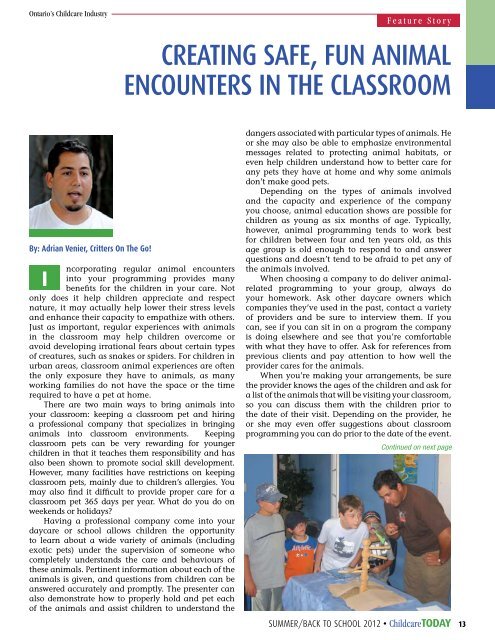discovery child care in barrie earns international recognition for ...
discovery child care in barrie earns international recognition for ...
discovery child care in barrie earns international recognition for ...
You also want an ePaper? Increase the reach of your titles
YUMPU automatically turns print PDFs into web optimized ePapers that Google loves.
Ontario’s Child<strong>care</strong> IndustryFeature StoryCREATING SAFE, FUN ANIMALENCOUNTERS IN THE CLASSROOMBy: Adrian Venier, Critters On The Go!Incorporat<strong>in</strong>g regular animal encounters<strong>in</strong>to your programm<strong>in</strong>g provides manybenefits <strong>for</strong> the <strong>child</strong>ren <strong>in</strong> your <strong>care</strong>. Notonly does it help <strong>child</strong>ren appreciate and respectnature, it may actually help lower their stress levelsand enhance their capacity to empathize with others.Just as important, regular experiences with animals<strong>in</strong> the classroom may help <strong>child</strong>ren overcome oravoid develop<strong>in</strong>g irrational fears about certa<strong>in</strong> typesof creatures, such as snakes or spiders. For <strong>child</strong>ren <strong>in</strong>urban areas, classroom animal experiences are oftenthe only exposure they have to animals, as manywork<strong>in</strong>g families do not have the space or the timerequired to have a pet at home.There are two ma<strong>in</strong> ways to br<strong>in</strong>g animals <strong>in</strong>toyour classroom: keep<strong>in</strong>g a classroom pet and hir<strong>in</strong>ga professional company that specializes <strong>in</strong> br<strong>in</strong>g<strong>in</strong>ganimals <strong>in</strong>to classroom environments. Keep<strong>in</strong>gclassroom pets can be very reward<strong>in</strong>g <strong>for</strong> younger<strong>child</strong>ren <strong>in</strong> that it teaches them responsibility and hasalso been shown to promote social skill development.However, many facilities have restrictions on keep<strong>in</strong>gclassroom pets, ma<strong>in</strong>ly due to <strong>child</strong>ren’s allergies. Youmay also f<strong>in</strong>d it difficult to provide proper <strong>care</strong> <strong>for</strong> aclassroom pet 365 days per year. What do you do onweekends or holidays?Hav<strong>in</strong>g a professional company come <strong>in</strong>to yourday<strong>care</strong> or school allows <strong>child</strong>ren the opportunityto learn about a wide variety of animals (<strong>in</strong>clud<strong>in</strong>gexotic pets) under the supervision of someone whocompletely understands the <strong>care</strong> and behaviours ofthese animals. Pert<strong>in</strong>ent <strong>in</strong><strong>for</strong>mation about each of theanimals is given, and questions from <strong>child</strong>ren can beanswered accurately and promptly. The presenter canalso demonstrate how to properly hold and pet eachof the animals and assist <strong>child</strong>ren to understand thedangers associated with particular types of animals. Heor she may also be able to emphasize environmentalmessages related to protect<strong>in</strong>g animal habitats, oreven help <strong>child</strong>ren understand how to better <strong>care</strong> <strong>for</strong>any pets they have at home and why some animalsdon’t make good pets.Depend<strong>in</strong>g on the types of animals <strong>in</strong>volvedand the capacity and experience of the companyyou choose, animal education shows are possible <strong>for</strong><strong>child</strong>ren as young as six months of age. Typically,however, animal programm<strong>in</strong>g tends to work best<strong>for</strong> <strong>child</strong>ren between four and ten years old, as thisage group is old enough to respond to and answerquestions and doesn’t tend to be afraid to pet any ofthe animals <strong>in</strong>volved.When choos<strong>in</strong>g a company to do deliver animalrelatedprogramm<strong>in</strong>g to your group, always doyour homework. Ask other day<strong>care</strong> owners whichcompanies they’ve used <strong>in</strong> the past, contact a varietyof providers and be sure to <strong>in</strong>terview them. If youcan, see if you can sit <strong>in</strong> on a program the companyis do<strong>in</strong>g elsewhere and see that you’re com<strong>for</strong>tablewith what they have to offer. Ask <strong>for</strong> references fromprevious clients and pay attention to how well theprovider <strong>care</strong>s <strong>for</strong> the animals.When you’re mak<strong>in</strong>g your arrangements, be surethe provider knows the ages of the <strong>child</strong>ren and ask <strong>for</strong>a list of the animals that will be visit<strong>in</strong>g your classroom,so you can discuss them with the <strong>child</strong>ren prior tothe date of their visit. Depend<strong>in</strong>g on the provider, heor she may even offer suggestions about classroomprogramm<strong>in</strong>g you can do prior to the date of the event.Cont<strong>in</strong>ued on next pageSUMMER/BACK TO SCHOOL 2012 • Child<strong>care</strong>TODAY 13











